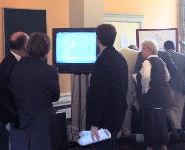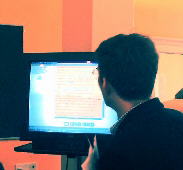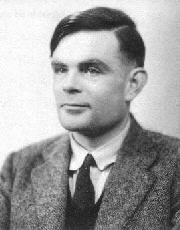Turing Sources See the Alan Turing Home Page for a guide to this website. |
Alan Turing Archives and PhotographsNotes by Andrew Hodges,
|
The Turing ArchiveThe Turing Archive, the most important collection of Alan Turing's papers, is held in the Modern Archives Centre at King's College, Cambridge.The King's College archivists have prepared a summary of the Turing Archive. Much of the cataloguing work was done in the 1970s by the Contemporary Scientific Archives Centre. |
 The Modern Archives Centre, King's College, Cambridge |
The Turing Digital ArchiveMuch of this collection of papers has been scanned or photographed to a high quality by the Intelligence Agents Multimedia department at Southampton University.Since June 2000 the material has available on-line as the Turing Digital Archive. This material is presented in an archival format without much editorial comment, although there is a search engine. The Turing Bibliography gives pointers to all the scientific papers. Jonathan Swinton's guide to the morphogenesis manuscripts should be used. |
 Jonathan Swinton, then a Fellow of King's College, shows the new Digital Archive to guests of the Turing/Keynes event, 24 June 2000. |
Proceed to the Turing Digital Archive: |
 He is a leading scholar of Turing's morphogenesis manuscripts one of the most important aspects of the Archive. |
| There is another small collection in the National Archive for the History of Computing at Manchester. It contains two files of Turing's programming for morphogenesis. See the catalogue, page 109. |
A note on papersThere is an ambiguity about the expression 'papers' in scientific and academic work. It may refer to someone's published papers, or to personal papers. The distinction is not always made clear. In Turing's case the distinction is particularly hard to draw, since important work of his went unpublished, and his personal papers are a vital source of scientific material. This Archives page concerns Turing's personal papers. His published papers are listed on the Turing Bibliography page, together with notes on work which was unpublished in his lifetime but has subsequently appeared.In 2010 there was much in the news about a campaign to save 'Turing's papers'. See a BBC report here. Some people may have believed this to be a campaign to save Turing's personal papers. Indeed this newspaper report described them as his 'secret papers'. In fact, the papers concerned were M. H. A. Newman's collection of offprints of Turing's published work. The personal papers were, all the time, safe in the hands of King's College, Cambridge. (They do in fact include a number of his own offprints. There are more offprints in the collection of the National Archive for the History of Computing at Manchester.) In the end, Newman's collection was acquired by Google for a vast sum and donated to the Bletchley Park Museum. See a BBC report here. |
Photographs of Alan TuringThere are not many photographs of Alan Turing, and most of them are of him as a boy. There are copies of them in the Turing Archive at King's College. Scans of the photographs can be seen on this page of the Digital Archive. If you are searching for pictures of Alan Turing to illustrate a publication, you should go to the Digital Archive site and follow the instructions there for obtaining copies from the Archive. The archivist will assist you with copyright questions. |
| The portrait photograph on the right was taken at the time of Alan Turing's election to a Fellowship of the Royal Society in 1951. There is another one, taken at the same session but in a slightly different pose, which was used by the Royal Society for illustrating the Biographical Memoir of Turing in 1955. You will find that these portraits have frequently been reproduced on the Web, but the copyright of them belongs to the National Portrait Gallery, London. In 2009 the National Portrait Gallery included Alan Turing's portrait in a special exhibition of Gay Icons. It was chosen by Lord Chris Smith, who had also made a notable statement about Alan Turing in 1998. |  |
Continue:
| Quick Links: |
|
|
|
|
|
|
| |||